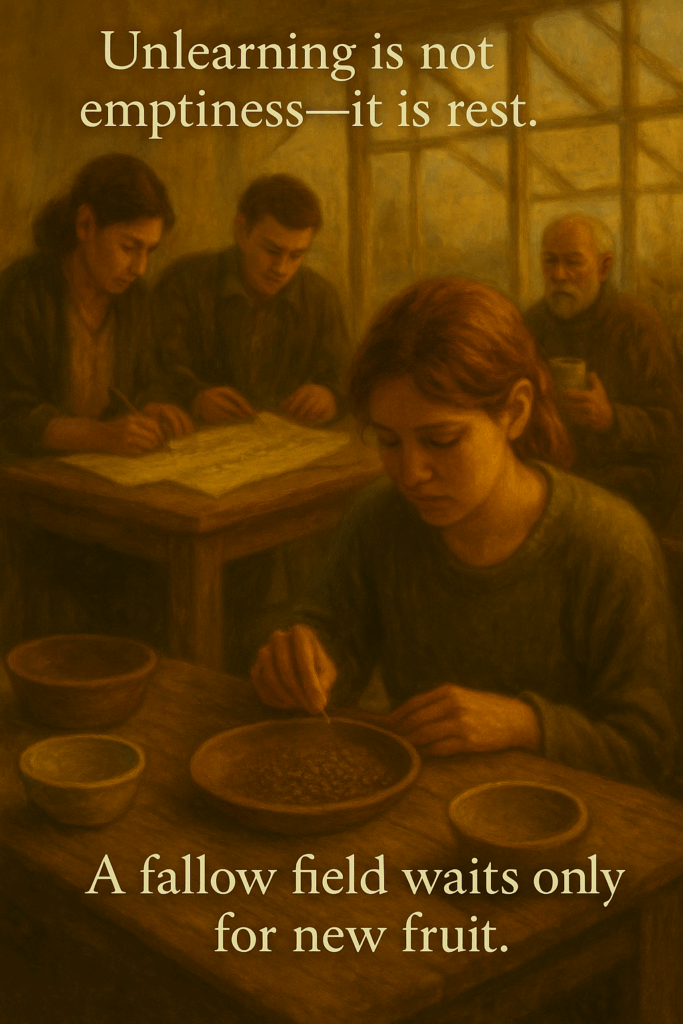
The greenhouse, once a refuge, had become a crucible. Morning light slanted through the patched glass panes, sharper now, illuminating every scar on the benches, every water stain on the soil. The rhythm of work was slower, more deliberate—like a heart learning a new beat.
Lara arrived at dawn. She didn’t knock, didn’t speak. She stood at the threshold as though she had run out of other doors to try. A grey sweatshirt hung loose on her frame, her hands shoved into the pockets, her gaze fixed on the damp floorboards.
Emil, bent over a storm-shocked fern, looked up. He didn’t smile or frown. Only a brief nod passed between them before Mrs. Nouri’s voice filled the silence.
“Sit,” the old groundskeeper said, sliding a shallow bowl of seeds toward her. A confusion of sizes, shapes, and colors—chaos waiting for patience. She handed Lara a magnifying glass. “Sort them. Large here, small there, dust in the last. Your eyes will trick you. Let your fingers learn what is true.”
Lara sat stiffly, unused to the geography of such labor. The seeds spilled through her hands like dark sand. She fumbled, misjudged, dropped medium seeds into the pile of giants.
Sam, working nearby, reached over without a word. She plucked a single sunflower seed from the wrong dish, setting it among its kin. “This one’s a giant,” she whispered. “It belongs with giants.” Then she returned to her work.
Heat rose in Lara’s cheeks. This was no debate to win, no proclamation to craft. It was a test she could only pass by surrendering—by unlearning.
At the workbench, another kind of sorting was underway. Emil, Priya, and Elias sat with the brittle pages of the Student Council charter, its “executive authority” clauses heavy with the rot of hierarchy. Elias tapped the page with a pen. “This is where it curdled.”
Priya didn’t hesitate. She drew a black line straight through the clause. The sound of ink tearing across paper rang louder than any gavel. “Not weeded,” she said. “Uprooted.”
Line by line, they dismantled the old fortress. In its place, fresh words bloomed on unlined paper: The Stewards’ Compact. Not rules of command, but principles of care. Not permissions, but commitments.
From the doorway, Grandfather leaned on his stick, tea steaming in his hand. His eyes lingered on Lara’s fumbling fingers, then drifted to the trio unmaking the old world.
“She is not the only one unlearning,” he murmured to Emil. “You are unlearning the habit of opposition. To fight a fortress is still to be defined by it. Better to be defined by what you grow in its place.” He gestured toward Lara, bent over the bowl of chaos. “A field left fallow is not empty. It is resting. Let her soil rest before asking it to bear fruit again.”
The morning stretched. The piles of sorted seed grew, small but steady. The Compact thickened with language of stewardship, not control. And in the ledger, Priya wrote in her clear, firm script:
“The Unlearning — Day 1. Council dissolved. Compact begun. Seeds sorted.”
She did not write Lara’s name. She didn’t need to. Her presence was woven into every line.
When the bell for first period rang, Lara finally emptied the bowl. Her back ached, her eyes burned, but her hands no longer shook. Three neat piles lay before her: giants, middlings, dust-fine specks of potential.
Mrs. Nouri leaned over, peered through her spectacles, and gave a short, grunted nod. “Good enough.”
Lara exhaled. It wasn’t triumph. It was something quieter. Something humbler. She had not commanded, not decreed. She had only sorted seeds without breaking them.
The first weed—pride—had been pulled.
The ground was clearing.

